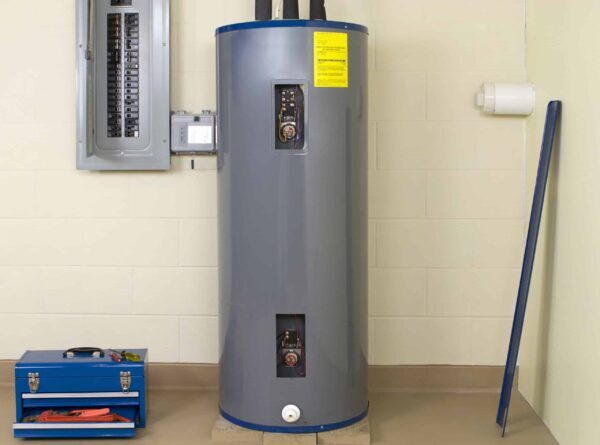
Ideally, the water heater in your Columbus, Ohio home should have a pristine and completely blemish-free appearance. Dents and other forms of structural damage are cause for concern. Although dented water heaters can continue heating and holding water, this doesn’t mean that they’re working efficiently. Read on to find out how dents impact the functionality of water heaters and what you can do about them.
Large Dents Can Lead to Heat Loss
Water heaters are pressure tanks comprised of heavy-gauge steel. Standard, tank-based water heaters warm water up and hold it until it’s used. Thus, the efficiency of these units is determined in part by their heating methods and by the amount of energy required for heating. It is also determined by the tank’s ability to retain or hold heat. Good heat retention limits the number of times that stored water must be rewarmed. To this end, water heater manufacturers encapsulate steel tanks in fiberglass insulation. This insulation is then wrapped with a thin metal covering that serves as the unit’s final layer.
Even seemingly minor cosmetic dings at a water heater’s outermost layer can be problematic. Wherever this layer is dented or pushed in, the insulation that lies just beneath it is likely crushed, compressed, or separated. Any areas with insulation damage will result in greater than normal heat loss. The more dents and dings that a water heater has, and the larger that these dings are, the more energy this unit will ultimately use to reheat stored water until it’s distributed at the tap.
The Location of Dents Matters, Too
Significant decreases in overall efficiency aren’t the only problem associated with gouges, dents, and other structural water heater damage. If your water heater has sizable dents just at the connection between its tank and the supply pipe, this may be an indication of plumbing problems. When the pipes that supply water to water heaters leak, structural issues tend to develop at the tank exterior right near this connection. Moreover, any deformation here can cause the plastic cap that secures the connection to fall off. As a result, widespread water damage can occur, and the heating system itself could fail.
Insufficient Hot Water
A dented water heater with compressed or separated insulation will eventually cause your energy bill to rise. However, even before this increase is noticed, you may find yourself dealing with a hot water shortage. Unfortunately, tank-based water heaters always have a limited capacity for hot water supply. After the hot water in their tanks is used, building residents must wait for the next heating cycle to finish. This is already problematic in households with numerous residents and substantial hot water demand. However, when heat is constantly being lost from the water that’s stored in tanks, it can be difficult to get any truly hot water at all.
How Do Water Heaters Get Dented?
Among the most common causes of water heater damage is careless installation. Although the inner portion of these units is comprised of high-density steel, the thin metal layer that lies at their exterior can be easily bent during impact events. When a water heater is propped up on its side just before installation, this outer shell can crumple at all points of contact, especially if the exterior shell itself is bearing the brunt of the unit’s weight. Dents can also develop if a water heater is dropped prior to installation or if it’s accidentally hit with a heavy tool.
Unreported Dents Could Impact Your Warranty
If your water heater was dented during installation, you should report this damage to the manufacturer right away. Any structural damages that aren’t reported throughout the duration of your manufacturer’s warranty could lead to the loss of this protection. Reporting structural damage is especially important to do when dents, gouges, and other dings are greater than 3 millimeters in length or depth.
What a Home Inspector Might Say
Water heaters with small-sized dents frequently pass home inspections. An inspector might determine that the size, location, and depth of dents are not sufficient to compromise the efficiency of your water heater’s fiberglass insulation. When water heater dents are clearly not affecting the inner parts of the unit and the unit’s overall operation, potential losses in efficiency may be overlooked. In most cases, dents that are just 3 millimeters in depth or shallower are deemed as having a limited impact on insulation and absolutely no impact on the water heater functioning at all.
Is It Possible to Repair Water Heater Dents?
There are multiple ways to improve the aesthetics of a dented water heater. Suction techniques like those used in paintless automotive dent repair can smooth out the outer layer of your water heater’s tank. When suction doesn’t work, hooks, pliers, and other hand-held tools can achieve similar results. However, neither of these techniques will fix the underlying fiberglass insulation if it’s been crushed or compressed and it has lost its insulating effects. Water heater tanks with dents that are 4 millimeters deep or greater should be inspected for losses in functionality, safety, and efficiency and replaced as needed.
When Do Dents Matter Most?
Most small-sized nicks and dings are considered purely aesthetic. Larger blemishes may lead to heat loss, substandard operation, and the loss of warranty protections. When found near the tank-to-pipe connection, it’s important to consider the possibility that newly formed dents are the result of faulty plumbing, leaky pipes, or other water-related issues that require immediate inspection. In all cases, if your water heater has any sizable dents on its exterior, it’s best to schedule a professional inspection.
How to Avoid Tank Dents
From higher energy bills to a decreased hot water supply, there are many reasons to proactively prevent tank dents. One of the best ways to sidestep structural tank damage is by having your water heater installed by seasoned, reputable professionals. These units are large, cumbersome, and easy to drop. Even simply setting a hot water heater tank down incorrectly could result in lasting issues. Having professionals take care of these projects is also essential for keeping your manufacturer’s warranty intact and ensuring that the job is properly permitted.
However, to sidestep all of the problems that come with tank-based water heaters, you can alternatively have a tankless, point-of-use water heater put in. Given that these water heaters don’t store hot water indefinitely, they use far less energy overall. They also take up less space, and they’re far less likely to sustain dents, dings, and other issues that negatively impact their performance. When replacing an old, dented water heater, upgrading to a modern, tankless design is a great way to save money, reduce your carbon footprint, and ensure that your new unit maintains its structural integrity throughout the entirety of its life span.
We’re committed to helping residents of Columbus, Ohio save money and protect their home investments. We offer furnace and air conditioner installation, maintenance, and repair services. We also provide plumbing, water heater, and slab leak repair services. If your water heater is dented or if it’s nearing the end of its life span, give Apex Plumbing, Heating, and Air Pros a call today!





